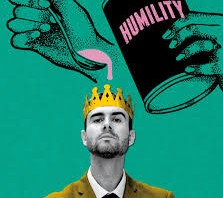
Humility: The Most Counter-Cultural Ideal?
I try to watch a limited amount of TV, but when I do, I try to avoid commercials. In my opinion, they often show the worst of society: rampant consumerism, stark individualism and pervasive self-absorption.
“Lighten up,” you might say. “Some of them are funny. And they are trying to sell things, and to do that, they have to appeal to our sense of the need for stuff. ‘I want that,’ is what they’re aiming for.”
That may be, but neither the widespread use of humor nor an explanation of their goals cancels the fact that they fly in the face of moderation, a sense of the common good and humility.
Strut, Shout and Gesture
Humility, in fact, may be the most counter-cultural of values today. Watch the typical NFL football game and you’ll see that after many plays, players strut, shout and gesture their “greatness,” as if making a tackle is equivalent to finding the cure for cancer. Apart from football, TV “celebrities” are shown with fans fawning over them, as if making a movie or having a hit song reveals s a person’s true “greatness.”
No, humility is no great value in today’s society. “Blessed are the meek” is anathema.
Maybe that’s why Pope Francis talks about it so much, noting its importance for people searching for God.
And he starts close to home, exhorting the Vatican cardinals, bishops and bureaucrats in this past Christmas message to embrace humility, “saying their pride, self-interest and the ‘glitter of our armor’ was perverting their spiritual lives and corrupting the church’s mission,” according to a news report.
Stiff Resistance
This is a pope who, it is said, was elected because he was perceived to be a candidate who would reform the Vatican, with which even conservative Catholic bishops were said to be fed up. But as he has attempted to do so, he has met stiff resistance. In his view, the resistance stems from the pride and intransigence of people working at the church’s headquarters whose titles, dress and perceived stature has only heightened their false sense of self-importance.
But, of course, it’s not only Vatican officials who need this message. Pride is a universal human weakness, well-illustrated during the Christmas season by the specter of the fictional Ebenezer Scrooge.
But what is humility and why is it desirable?
In my view, humility isn’t wimpiness. Instead, it’s akin to honesty, about yourself, your talents and your limitations. Believers and people searching for God are called to be humble about themselves, and about their faith, trying as much as possible to see themselves as they are – nothing more, nothing less – and rejecting smugness about being a believer or about their religious practices.
Promoted Courage and Personal Toughness
Contrary to popular belief, Jesus didn’t preach wimpish humility. Based on the gospel as a whole, I don’t believe that’s what he had in mind when he said, “Blessed are the meek.” On the contrary, throughout his life he promoted courage and personal toughness in a society that matched today’s indifference, hard-heartedness and false pride.
He promoted recognizing our talents and using them for our own good and that of others, opposing “hiding them under a bushel.”
Mother Teresa, who so often exhibited humility during her life, describes it this way.
“Humility is the mother of all virtues…. It is in being humble that our love becomes real, devoted and ardent. If you are humble nothing will touch you, neither praise nor disgrace, because you know what you are.”

